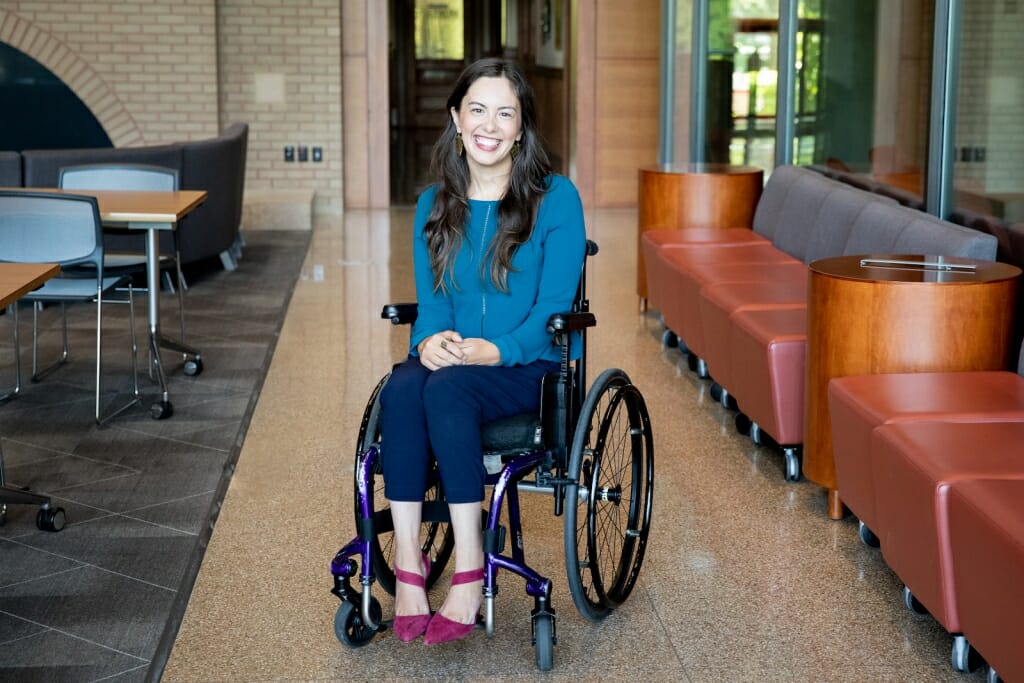New Faculty Focus: Carlyn Mueller

Carlyn Mueller
Carlyn Mueller, Assistant Professor, Rehabilitation Psychology & Special Education
Hometown: I’m originally from McLean, Virginia, which is right outside of Washington, D.C.
Educational/professional background: B.A. in Special Education, Goucher College; M.Ed in Learning, Diversity & Urban Studies, Vanderbilt University; PhD in Special Education, University of Washington
Previous position (title, institution): Academic Pathways Postdoctoral Fellow, Vanderbilt University
How did you get into your field of research? While completing my Master’s degree, I became completely fascinated (or, obsessed) with identity development and the relationship that positive identity development shares with academic achievement. From my own experience as a student with multiple physical and learning disabilities, I knew that identity related to disability wasn’t necessarily spoken about or explicitly developed in positive ways in special education. There were fundamental things about disability community history I didn’t learn about until I was an adult. That disconnection and lack of seeing disability as a collective identity matters. It’s really been a mix of learning from the incredible amount of identity scholarship out there, and thinking deeply about my own experience with disability as well.
What attracted you to UW–Madison? Obviously, the university’s research reputation is great: so that doesn’t hurt! Overall though, I have been so impressed by the university’s values around, and focus on curiosity and humility. I want to build community and interdependent relationships with people in the work that I do, and I felt like UW–Madison is a place where I could do that based on those values.
What was your first visit to campus like? Such a whirlwind, but so lovely. I will always remember leaving a string of meetings and the chair of my department saying: “Wow, you sure are laughing a lot!” Everyone was just so kind and welcoming that it made it easy to feel comfortable, even in a stressful situation.
What’s one thing you hope students who take a class with you will come away with? I would love it if students come away understanding that people with disabilities are the experts in their own experiences. So often in the field of special education, we train educators to think of themselves as the ultimate “helpers” — but students with disabilities have so much power, agency, and ability to guide us toward building educational systems that reflect their needs.
Is there a way your field of study can help the world endure and recover from the COVID-19 pandemic that has affected the health, finances and lifestyle of so many?
Alice Wong, a disability community activist, calls disabled people “modern day oracles.” So many of the accommodations that were made around coronavirus —online classes or jobs, virtual social events, curbside food pickup — are things that disabled people have been advocating for, long before the pandemic. I really believe that if we let people who are most marginalized by our current systems lead and change those systems, we can build a new world after the pandemic.
Do you feel your work relates in any way to the Wisconsin Idea? If so, please describe how. I feel really accountable to disability community in all my work. That also guides all of the research choices I make. I think the Wisconsin Idea is grounded in public service- and that service isn’t just making a passing mention of the communities we work in and serve.
What’s something interesting about your area of expertise you can share that will make us sound smarter during video chats (and eventually parties)? I always love to tell people about the Capitol Crawl, which was an important moment in disability history. Over 1,000 people marched to the steps of the U.S. Capitol to protest for disability rights and the eventual passage of the Americans with Disabilities Act in 1990. The youngest was an 8-year-old girl, Jennifer Keelan, who got out of her wheelchair and pulled herself up the Capitol steps. You can learn more about it in the movie Crip Camp, which is available on Netflix!
Hobbies/other interests: Watching literally all reality television, embroidery and weaving, drinking sour beers, and my tiny Chihuahua, Lou!




